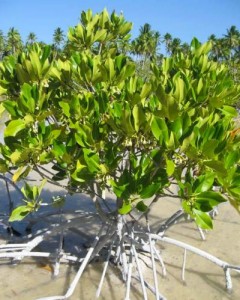United Nations University, Institute for Water, Environment and Health, Canada
14 Nov 2012
 Loss of mangroves to fish farms, other development, a poor economic trade-off risking human and environmental well-being
Loss of mangroves to fish farms, other development, a poor economic trade-off risking human and environmental well-being
Experts are urging policy makers to preserve mangroves and their essential services to nature and humanity alike, saying their replacement with shrimp farms and other forms of development is a bad economic tradeoff both short and long-term.
An unprecedented partnership of organizations – from forestry and conservation sectors and from across the United Nations – have released a policy brief drawing on the 2nd edition of the World Atlas of Mangroves (2010). It aims to provide managers with lessons learned in past mangrove conservation and management efforts, and with policy recommendations.
Found mostly in the tropics straddling the land and sea, mangroves make up less than half of 1% of forests of all kinds worldwide. Taken together, some 70 species of mangroves are found in 123 tropical and sub-tropical nations and territories but occupy just 152,000 square km in total — an area slightly larger than Nepal.
Yet these so-called “forests of the tide” provide enormous benefits to humanity, especially as essential harbors for biodiversity, as buffers against the destructive power of waves, and as nurseries for coastal and offshore fisheries worldwide.
Since 1980, the world has lost about one-fifth of mangrove forests and many of what remains is degraded, says the new policy brief, “Securing the Future of Mangroves.”
News release in full: click here
Example coverage:
Reuters, here
SDA (Switzerland), here
AGI (Italy), here
EFE (Spain), click here
Coverage summary: click here